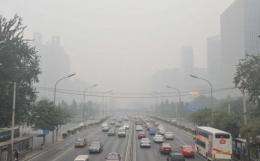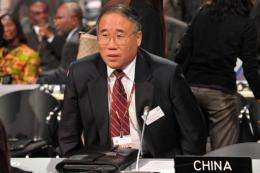Traffic makes its way through thich haze in Beijing in October. China, the world's top greenhouse gas emitter, said Tuesday it will push at next week's climate talks for an extension of the Kyoto Protocol, which requires rich nations to reduce their emissions.
China, the world's top greenhouse gas emitter, said Tuesday it will push at next week's climate talks for an extension of the Kyoto Protocol, which requires rich nations to reduce their emissions.
Beijing's top climate negotiator Xie Zhenhua also called on wealthy nations to hammer out a funding mechanism to help developing countries implement efforts to address global warming at the Durban meeting.
But he said China would only take on commitments "appropriate to our stage of development", reiterating Beijing's long-held view that poorer countries should not be required to make binding commitments on emissions.
"The emission-reduction plan for developed countries in the second commitment period under the Kyoto Protocol should be made clear as soon as possible," Xie told reporters, ahead of next week's UN climate talks in Durban.
The first commitment period expires at the end of 2012.
"Developed nations... must according to the Kyoto Protocol commit to a first commitment period and a second commitment period on reduction targets.
China, the world's top greenhouse gas emitter, said Tuesday it will push at next week's climate talks for an extension of the Kyoto Protocol, which requires rich nations to reduce their emissions. Beijing's top climate negotiator Xie Zhenhua (seen here in 2009) also called on wealthy nations to hammer out a funding mechanism to help developing countries implement efforts to address global warming.
"Developing nations, after receiving funds and technology, should adopt active amelioration actions."
China has always said that developed nations, with their long history of industrialisation, should take responsibility for climate change.
But the lack of binding constraints over giants like China and India and the refusal of the United States to join the protocol has gravely weakened efforts to address the issue, especially after the near collapse of climate talks in Copenhagen in 2009.
Canada, Japan and Russia have already refused to sign on for a second commitment period, objecting to the lack of legal constraints on the world's biggest carbon polluters.
Europe says it can accept a continuation, provided China and the US show they are serious about major cuts in the coming years.
"There is a view from the international community that China is the number one emitter of carbon dioxide and its emissions are growing rapidly," Xie said, referring to the main greenhouse gas that causes global warming.
"This assessment is correct, China's current emissions of greenhouse gases are very huge, and the increase is very rapid. This is a fact."
Xie said China was doing all it could, and had in 2009 committed to reduce greenhouse gas emissions per unit of gross national product by between 40 and 45 percent by 2020 compared with 2005 emissions.
But he conceded that China's overall emissions would increase during the period to 2020.
"We are adopting active measures to reduce the speed of increase of greenhouse gases in an effort to reach a peak of carbon dioxide emissions at an early date," Xie said.
He refused to predict when China's greenhouse gas emissions would peak.
(c) 2011 AFP
























